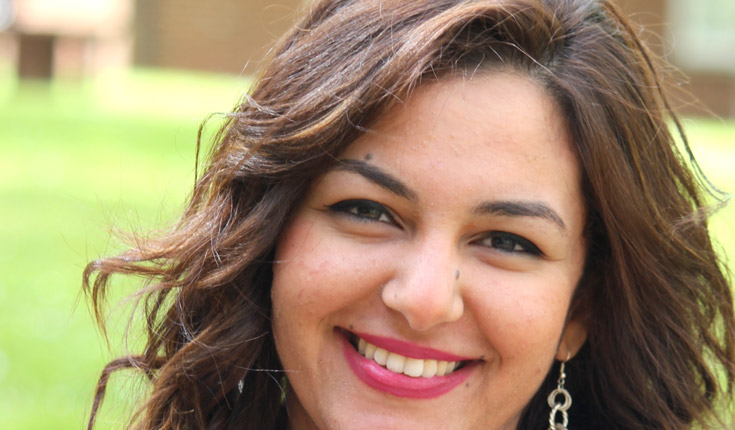
The challenge of the GMAT experience made me know what to expect when I started my MBA.
Aya Ghaleb is a full-time MBA student at the Cranfield School of Management at Cranfield University
I am a business analyst with four years of banking experience in the largest private bank in Egypt. I value perfection and achievement and have always strove to excel in whatever I do. I graduated with highest honours from the German University in Cairo with double specializations in Finance and International Business. I then joined the banking sector where I continued to outperform. I was handpicked by the bank’s senior management to join an accelerated career path program to prepare me to become a future leader. During this period, I have had the opportunity to work with many senior executives on strategic projects and learned a lot about the banking sector in Egypt. I am proud of what I have achieved so far and I believe that it is because of my dedication and hard work that I have reached where I am right now.
Dream career: Management Consultant
Why Business School?
Because there is so much opportunity to learn and develop. In b-schools, you challenge yourself every day, you work with people from diverse backgrounds but most importantly you stretch your boundaries and get yourself out of your comfort zone!
Best GMAT study tip?
Practice, Practice, Practice! it is a learning curve, the more you solve questions the better you perform.
Before business school, I was: A business analyst at the largest private bank in Egypt. I also worked as a teaching assistant at the German University in Cairo for a year after graduation.
When I’m not in class, you’ll find me: Hanging out with friends, exploring new places, or reading an interesting book.
Remember: it's all about the journey.
Advice for anyone thinking about b-school?
Before applying, think about why you want to do an MBA and what you are hoping to achieve. Do loads of research and try to find a school that best suits you and your plans.
My remedy for pre-test nerves: Going for a run.
On the day before your exam, you should:
Try to relax as much as you can and keep your mind off the GMAT exam.
How did you fit studying for the GMAT exam into your busy schedule?
It’s all about commitment and planning ahead. I created a schedule two months before the exam and allocated two to three hours every day to practice solving GMAT questions. I also sometimes paired up with friends who were studying for GMAT to share notes and help each other in tackling difficult questions.
How well-prepared for business school do you feel, after studying for the GMAT exam?
Well prepared. The challenge of the GMAT experience in terms of both the intensity and time pressure made me know what to expect when I start my MBA programme.
What Diversity Means in the MBA Environment
"Our cohort consists of 70 people from 27 different countries. They have extensive experience in various sectors and industries. So, you can imagine the level of debate and discussions we have in class."
Full transcript
"Hi! My name is Aya Ghaleb and I’m currently doing my MBA at Cranfield University in the United Kingdom and today I’d like to talk to you about my story with diversity in the MBA environment. Before coming to Cranfield, I always worked in teams with people with very similar backgrounds; they’ve been to similar universities; and they almost have similar lifestyles. And then I arrived to Cranfield and I was impressed by my colleagues. Our cohort consists of 70 people from 27 different countries. They have extensive experience in various sectors and industries. So, you can imagine the level of debate and discussions we have in class. I myself had an opportunity to work in a very diverse team during the first term of the MBA. Our team consisted of six people from Japan, India, Russia, United Kingdom, and myself, from Egypt. It was very hard, at the beginning, to coordinate and to reach a middle ground because obviously we have different motivations; we have different expectations; and even our communication styles were very different. But, by time, when we realized that we could actually leverage our differences and that it is because of our unique set of skills that we bring different things to the table, that we could actually outperform. And when we started doing that, and when we started trusting each other, we became a role model to the rest of the teams and we outperformed in every single project we delivered. And so I think it’s all about communication. When you’re open in communicating with others, when you’re flexible and understanding of how others perceive the map of the world, you become less focused on how different you are, and more focused on how together we can create value."
How the MBA Empowered Me and Ignited My Leadership
"Leadership is about the collective efforts rather than your individual efforts."
Full transcript
"Hi, my name is Aya Ghaleb. I'm currently studying for my MBA at Cranfield University in the United Kingdom. And today I’d like to share with you how the MBA helped me develop my leadership skills. So let me tell you my story. A year ago when I started applying for an MBA, I was looking for top ranked schools, well-known professors and of course interesting courses. But I didn’t give so much thought to the experience itself. And I think that is something all of us tend to underestimate while we are applying for an MBA program. And then I arrived to Cranfield and I realized the true value of the MBA lies in the journey itself and not in the destination. During the last six months I had an opportunity to work with different people and I learned a lot about myself, my strengths, my weaknesses and my leadership style. I also know that it’s all about self-awareness because when you know who you are and what you can do you can actually manage other people. But when you don’t know what you have and when you don’t know what you lack you don’t know what you need to get out of the people who you are working with. And that’s what makes you a successful leader. I also learned that leadership is about the collective efforts rather than your individual efforts. Yes, it is true that as a leader you need to define the goals for your team, you need to set the vision, but you also need to understand the motivations of the people you’re working with, you need to trust them and rely on them. Other than that you won’t succeed. So my advice to you would be take the maximum out of your MBA experience, participate in as much activities as you can, try to get to know every single person in your cohort, because the more actions you do and the more conversations you engage in, the more this will have an impact on you as a person. And remember it’s all about the journey."
Practice, Practice, Practice to Succeed on the GMAT Exam
"I was trying to train myself as much as possible to the environment of the GMAT exam and try to simulate the environment to be exactly similar to the exam day."
Full transcript
"Hi, my name is Aya Ghaleb. I'm currently studying my MBA at Cranfield University in the United Kingdom. And today I’d like to share with you my story with the GMAT and why I think practice is key to succeeding in the GMAT exam. At the beginning when I started preparing for the exam I struggled a lot because I have a maths background so I used to attempt to solve every single question mathematically to the end, which is of course impossible in the time constraints you have during the exam. So what I tried to do is I decided to allocate two months for preparing for the exam. Some people would tell you this is a lot, some people would tell you this enough, but for me it was just appropriate. So what I did during the first month is I focused on familiarizing and refreshing my memory with all the concepts because some of the concepts I haven’t dealt with in at least 12 years. And as soon as I read about a particular topic I used to solve a lot of practice questions from different sources and with different levels of difficulty to make sure that I absorbed the material really well. I also found it very helpful to keep track of all the challenging questions so that during the review before the exam I could refer to this list and have a look at the questions and try to find shortcuts for them. The next month I focused on solving a full mock GMAT exam and by doing that I was trying to train myself as much as possible to the environment of the GMAT exam and try to simulate the environment to be exactly similar to the exam day. And obviously this is something you need to do because it is challenging to keep focused for a couple of hours in a row with full attention with minimum breaks. So bottom line is my advice to you practice, practice, practice. It is a learning curve that improves over time. And it’s the only way to master the GMAT exam."
How to Apply to an MBA Program the Right Way
"I want you to think about your application as your story, what’s the image you want to draw through your application?"
Full transcript
"Hi, my name is Aya Ghaleb. I'm currently studying for my MBA at Cranfield University in the United Kingdom. And today I’d like to give you a slightly different perspective on how you can apply for an MBA program in the right way. And it’s about the use of storytelling on your application. When you go to a business school you will hear a lot about the art of storytelling and how it’s the best way to get people engaged and to get your message across. And that’s exactly what I want you to do. I want you to think about your application as your story, what’s the image you want to draw through your application? What qualities you think you have that will make you an excellent fit for the school? What achievements you’ve made through your life that you’re proud of. And definitely what failures you’ve passed through that made you who you are right now. Once you have all of these examples and stories in your mind, try to link them together and connect the dots. What I did when I was applying I talked to a friend of mine who I knew could think outside the box. And through our discussions and brainstorming sessions he helped me link the dots and build a coherent and interesting story about myself. Once you’re done with your story go through it several times, show it to several people who you believe know you well and try to see if they can interpret the key message you would like to convey about yourself through your story. So my advice to you, your application is your story, keep it as interesting as possible."


